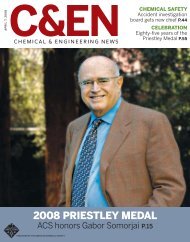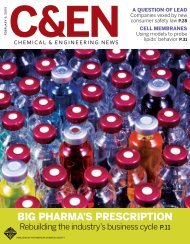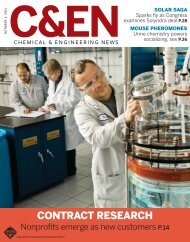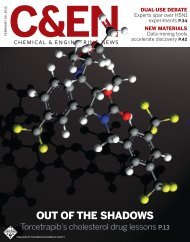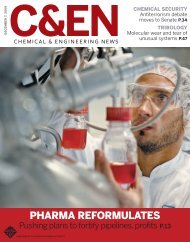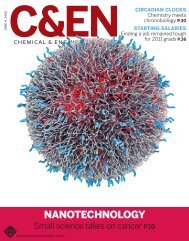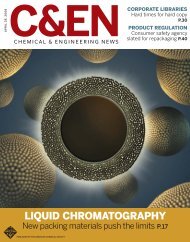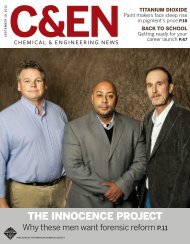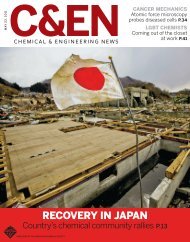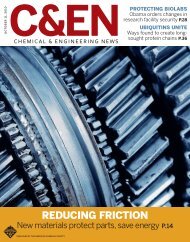June 20, 2011 - IMM@BUCT
June 20, 2011 - IMM@BUCT
June 20, 2011 - IMM@BUCT
Create successful ePaper yourself
Turn your PDF publications into a flip-book with our unique Google optimized e-Paper software.
BUSINESSMICHAEL MCCOY/C&ENAN INDUSTRY REVIVEDChemical executives at ANNUAL MEETING revelin good times, stay wary on regulationsMICHAEL MCCOY , C&EN NORTHEAST NEWS BUREAUTHE MOOD WAS buoyant at the AmericanChemistry Council’s annual meeting atthe Broadmoor hotel in Colorado Springsearlier this month. The recession is justa distant bad memory for most chemicalcompanies, and the legislative tidal wavecompanies once feared has ebbed, at leastsomewhat, with the now-divided Congress.At a press conference, Calvin M. Dooley,ACC’s president and chief executive officer,described the remarkable economicturnaround he has witnessed since his firstannual meeting at the industry trade association’shelm, in <strong>June</strong> <strong>20</strong>09.“Two years ago this industry was strugglingto respond to one of the steepestrecessions this country had faced in sometime,” he said. “Few of us would have anticipatedthat we’d see the industry turnaround and be in one of the strongest positionsit’s been in in decades.”One of the reasons for that strength isample U.S. supplies of low-cost naturalgas, which chemical companies use as bothenergy source and raw material. Companyrepresentatives on ACC’s executive committeeexplained that the good feedstockposition means chemical makers can compensatefor any lingering softness in theU.S. economy by exporting products intothe global marketplace.B. Chuck Anderson, president of OccidentalChemical and vice chairman ofACC’s board, said his firm’s exports ofpolyvinyl chloride are more than compensatingfor continued weakness in the U.S.LINEUP Dooley(from left),Anderson,Dow CorningChairman andACC Chairof the BoardStephanieBurns, andMorrisonprepare tomeet reporters.construction market. “I don’t see a lot ofU.S. markets that are booming,” he said.“In general, the recovery is global.”Anderson marveled at the good fortunepervading the U.S. basic chemicals industryat present—a fortune resulting largelyfrom the competitive advantage that lownatural gas prices have created. “Marginsare at almost historic highs,” he said. “Petrochemicalcompanies are reporting somepretty good results, and I expect to see phenomenalones in the second quarter.”One of ACC’s goals for the comingmonths and years, Dooley said, will be toensure that the good times continue for itsmember companies. He vowed to maintainthe association’s relentless focus on in-thetrenchesadvocacy. Since Dooley, a formercongressman, joined ACC, a strategy ofadvocating for the industry with lawmakers,often on their home turf, has replaced abroader effort to educate the general publicabout chemistry through national advertisingand Web-based outreach.This strategy was in full effect at the association’sannual meeting a year ago, whenstaffers confessed to feeling under siegefrom the Obama Administration and theDemocratic majorities in the House of Representativesand the Senate. The siege hasweakened since last fall’s election, when theDemocrats lost control of the House.Still, Dooley isn’t resting easy. He contendedthat the White House is takingadvantage of the political gridlock in Washington,D.C., to advance an aggressive regulatoryagenda that is atodds with the President’sexecutive order thatregulatory decisions bebased on sound science.Craig O. Morrison,CEO of MomentivePerformance Materialsand ACC’s treasurer,pointed to a <strong>June</strong> <strong>20</strong>10Environmental ProtectionAgency finding thatformaldehyde can cause leukemia if inhaled.Believing the conclusion faulty, ACC successfullylobbied to have it peer reviewed bythe National Academy of Sciences (NAS).That review, published in April, said theleukemia finding went beyond available scientificevidence.Morrison credited ACC’s advocacy forhelping secure the peer review, although henoted that the fight isn’t over. “We continueto battle to ensure EPA … abides by theNAS ruling,” he said. “We understand thatwe have to be regulated. We just ask that itbe fact-based and scientifically based.”ANOTHER SOURCE of ACC advocacy, accordingto Anne Womack Kolton, the association’svice president of communications,is its 18-month-old political mobilizationdepartment, which is working to stop theNew Alternative Transportation to GiveAmericans Solutions Act, nicknamed theNATGAS Act, a bipartisan bill that proposesto subsidize the purchase of natural-gaspoweredvehicles. Concerned that such apolicy would suck up gas supplies and erodethe U.S. chemical industry’s new advantage,ACC is calling on member companies andtheir employees to raise their concerns withcongressional representatives.Opposition to the NATGAS Act is part ofa larger energy initiative that ACC’s executivecommittee green-lighted at the annualmeeting. In addition to sound natural gaspolicy, the initiative will advocate for makingenergy efficiency—often achieved withthe industry’s products—as important asrenewable energy in government policymaking.“Oftentimes energy efficiency getsshortchanged,” Dooley said. But it “is lowhangingfruit.”As with ACC’s other advocacy effortsunder Dooley, the energy initiative will benarrowly focused. “That message is goingto be targeted not at the broader public,”he said, “but at those elected officials andpeople in positions that have the ability toinfluence policy.” ■WWW.CEN-ONLINE.ORG 23 JUNE <strong>20</strong>, <strong>20</strong>11



